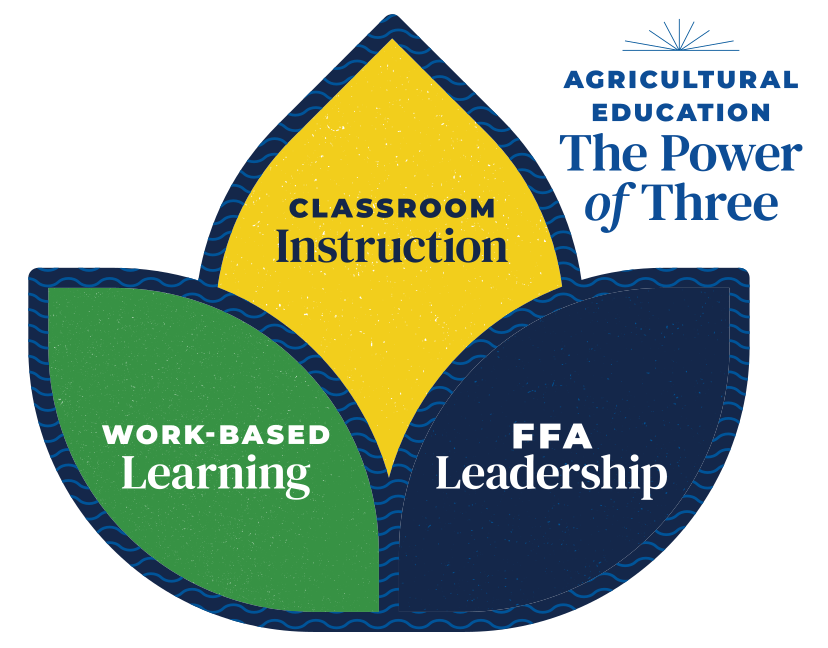For Administrators
Empowering your school’s future Leaders
From rural towns to urban cities, all schools and students can benefit from an agricultural education program. Agricultural education is an opportunity for students of all backgrounds to learn invaluable life skills, build paths towards rewarding careers, and become leaders in their communities. You can make a difference in the lives of your students and their families, your community, and your school.

how Agriculture
prepares students for the future
Learn why school administrators recommend having an agricultural education program at your school and why this can benefit any student.
Why Agriculture?


All Schools can benefit from agricultural education
Agricultural Education is a comprehensive, intracurricular opportunity for students to:
Explore 350 careers in agriculture, business, engineering, technology, advocacy, communications, education, and more.
Start a business and gain real work experience while still in high school.
Earn math, science, college, and dual credits in classes that qualify for the Indiana Honors and Technical Honors Diplomas.*
Compete at the local, state, and national level that brings pride and recognition to the school district.
Graduate and find a rewarding career , whether that’s through entrepreneurship, a technical trade, an associates degree, 4-year college, or joining the military.
Dive into inspiring, engaging, and hands-on learning that combines coursework, work-based learning, and leadership development.
Develop leadership and life skills including increased self-sufficiency, informed decision making, enhanced physical activity, and civic-mindedness.
Agricultural education is also a revenue generator for schools. Schools can receive $3,000 per student who graduates with Indiana Academic and Technical Honors Diplomas, and agricultural education courses qualify for these diplomas.
*Agricultural education is already primed to align with diploma changes being discussed at the state level. If Indiana moves forward with transitioning to the Indiana GPS Diploma and GPS Diploma Plus beginning with the class of 2029, agricultural education’s model of offering dual-credit classes, incorporating work-based learning, and providing certification and college credit opportunities in high school will fit perfectly into the new requirements.
*Students enrolled in agricultural education see 6‐7% higher graduation rates and increased community and industry involvement in high school.

The three component model of ffa
Agricultural Education at its best engages students in all three aspects, creating a comprehensive educational experience preparing them to succeed in life after graduation.

The three components of the model are Classroom Studies + Laboratory, Work-Based Learning, and FFA:
Classroom Studies + Laboratory: Classes under the umbrellas of agricultural education span many different industries including veterinary sciences, biotech, mechanics and engineering, horticulture, agribusiness, and environmental science.
Work-Based Learning: Experiential learning through the implementation of a Supervised Agricultural Experience (SAE), which can be entrepreneurship/starting a business, an internship, or community service, all with the guidance of an advisor. Learn more at SAEforall.org and ffa.org.
FFA/Leadership Development: FFA is the nation’s premier youth leadership organization preparing members for careers in the science, business, and technology of agriculture. FFA offers students opportunities to serve, lead, and compete at the local, state, and national level, travel domestically and internationally, and meet students across the state and country who share their similar interests and passions.
How to Get Started
There are many to get involved with agricultural education, whether you participate with an existing chapter or help your school create a new one.
If you want to start an agricultural education program at your school, we’re excited for you to join us! Learn more about starting an agricultural education program and FFA Chapter.
Here are some faqs to get you started:
Through agricultural education, students are provided with opportunities for hands-on learning, mentorship, leadership development, and personal growth, leading them to become future chemists, veterinarians, government officials, entrepreneurs, farmers, bankers, international business leaders, teachers and premier professionals in more than 350 careers. Discover potential careers at AgExplorer.FFA.org. And even if a student chooses another profession to pursue outside of the umbrella of agriculture, they still leave high school as informed consumers and community-minded citizens, aware of the importance and value of global agriculture, food, fiber, and natural resources systems.
Students are offered mentorship and guidance to start their own business or participate in an internship to gain real work experience, known as a Supervised Agricultural Experience (SAE). Learn more at saeforall.org and the FFA SAE Video Library.
Students can simultaneously earn Technical and Academic Honors designations upon successful completion of coursework, providing a springboard for work, technical school, collegiate and post-grad opportunities in a variety of fields.
FFA offers an opportunity for students to learn skills and gain confidence through competitions at local, state, and national levels in numerous categories. It’s often a way of bringing pride to the school and community in the same way sports or performing arts may do for schools.
While a preconceived notion might suggest agricultural education is only for students interested in pursuing careers in production agriculture, students actually learn a wide variety of applicable skills, including science, math, public speaking, leadership, management and technology.
Agricultural education plays a vital role in preparing students for more than 350 career paths,, and instills transferable values and life skills like self-sustainability and leadership.
Currently, more than 1,000,000 students participate in formal agricultural education instructional programs offered in grades 7-12 throughout the 50 states and three U. S. territories.
Acedemic Success
This Purdue University study provided the first baseline of FFA members’ academic success and
revealed that FFA members possess academic scores that are higher than the national average. FFA members show higher ACT and SAT scores on
average than the 2018 high school graduating class average. FFA members have a collective average ACT score of 23.5, compared to the national average of 20.8. FFA members have a collective
average SAT score of 1152, compared to the national average of 1068. Additionally, the average high school grade point average of FFA members is
a 3.69 out of 4.0 on an unweighted grade point average scale, which also means that 96 percent of members represented in this study are either A
or B students.
Career Readiness
The same study revealed that involvement with FFA is correlated with higher perceptions of career readiness.
Results of the study reveal that agricultural education students/FFA members possess skills and competencies typically associated with career readiness. FFA members scored a 73.1 out of 90 on a scale 2 measuring their communication skills, decision-making skills, skills in getting along with others, learning skills, management skills, skills in understanding themselves and skills working with groups. On an assessment 3 measuring their engagement, cognitive maturity, and innovativeness, FFA members scored a 109.8 out of 130. FFA members assigned themselves an average score of 85.2 out of 100 on a scale 4 measuring their ability to communicate in a variety of settings, including in public, a meeting, a group, a dyad, and with acquaintances, strangers, and friends. These results support the idea that FFA members possess the competencies that are critical in today’s workforce.
FFA Chapters can be found in 91 of the 92 counties in Indiana. You can locate chapters near you with FFA’s Chapter Locator. If your school does not currently offer agricultural education or FFA, you can find more information on how to start a program here.
For information on how to start an agricultural education program in your school, visit the links below.
Testimonials





